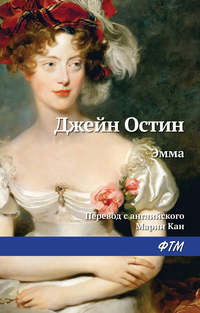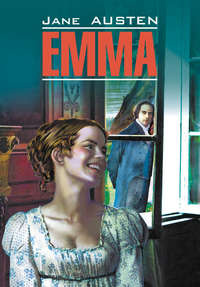
Полная версия
Mansfield Park
‘I think, sister, we need not keep Miss Lee any longer, when Fanny goes to live with you.’
Mrs Norris almost started. ‘Live with me, dear Lady Bertram! what do you mean?’
‘Is she not to live with you? I thought you had settled it with Sir Thomas.’
‘Me! never. I never spoke a syllable about it to Sir Thomas, nor he to me. Fanny live with me! the last thing in the world for me to think of, or for anybody to wish that really knows us both. Good Heaven! what could I do with Fanny? Me! a poor, helpless, forlorn widow, unfit for anything, my spirits quite broke down; what could I do with a girl at her time of life? A girl of fifteen! the very age of all others to need most attention and care, and put the cheerfullest spirits to the test! Sure Sir Thomas could not seriously expect such a thing! Sir Thomas is too much my friend. Nobody that wishes me well, I am sure, would propose it. How came Sir Thomas to speak to you about it?’
‘Indeed, I do not know. I suppose he thought it best.’
‘But what did he say? He could not say he wished me to take Fanny. I am sure in his heart he could not wish me to do it.’
‘No; he only said he thought it very likely; and I thought so too. We both thought it would be a comfort to you. But if you do not like it, there is no more to be said. She is no incumbrance here.’
‘Dear sister, if you consider my unhappy state, how can she be any comfort to me? Here am I, a poor desolate widow, deprived of the best of husbands, my health gone in attending and nursing him, my spirits still worse, all my peace in this world destroyed, with hardly enough to support me in the rank of a gentlewoman, and enable me to live so as not to disgrace the memory of the dear departed—what possible comfort could I have in taking such a charge upon me as Fanny? If I could wish it for my own sake, I would not do so unjust a thing by the poor girl. She is in good hands, and sure of doing well. I must struggle through my sorrows and difficulties as I can.’
‘Then you will not mind living by yourself quite alone?’
‘Dear Lady Bertram, what am I fit for but solitude? Now and then I shall hope to have a friend in my little cottage (I shall always have a bed for a friend); but the most part of my future days will be spent in utter seclusion. If I can but make both ends meet, that’s all I ask for.’
‘I hope, sister, things are not so very bad with you neither, considering. Sir Thomas says you will have six hundred a year.’
‘Lady Bertram, I do not complain. I know I cannot live as I have done, but I must retrench where I can, and learn to be a better manager. I have been a liberal housekeeper enough, but I shall not be ashamed to practise economy now. My situation is as much altered as my income. A great many things were due from poor Mr Norris, as clergyman of the parish, that cannot be expected from me. It is unknown how much was consumed in our kitchen by odd comers and goers. At the White House, matters must be better looked after. I must live within my income, or I shall be miserable; and I own it would give me great satisfaction to be able to do rather more, to lay by a little at the end of the year.’
‘I dare say you will. You always do, don’t you?’
‘My object, Lady Bertram, is to be of use to those that come after me. It is for your children’s good that I wish to be richer. I have nobody else to care for; but I should be very glad to think I could leave a little trifle among them worth their having.’
‘You are very good, but do not trouble yourself about them. They are sure of being well provided for. Sir Thomas will take care of that.’
‘Why, you know, Sir Thomas’s means will be rather straitened if the Antigua estate is to make such poor returns.’
‘Oh! that will soon be settled. Sir Thomas has been writing about it, I know.’
‘Well, Lady Bertram,’ said Mrs Norris, moving to go, ‘I can only say that my sole desire is to be of use to your family; and so, if Sir Thomas should ever speak again about my taking Fanny, you will be able to say that my health and spirits put it quite out of the question; besides that, I really should not have a bed to give her, for I must keep a spare room for a friend.’
Lady Bertram repeated enough of this conversation to her husband to convince him how much he had mistaken his sister-in-law’s views; and she was from that moment perfectly safe from all expectation, or the slightest allusion to it from him. He could not but wonder at her refusing to do anything for a niece whom she had been so forward to adopt; but, as she took early care to make him, as well as Lady Bertram, understand that whatever she possessed was designed for their family, he soon grew reconciled to a distinction which, at the same time that it was advantageous and complimentary to them, would enable him better to provide for Fanny himself.
Fanny soon learnt how unnecessary had been her fears of a removal: and her spontaneous, untaught felicity on the discovery, conveyed some consolation to Edmund for his disappointment in what he had expected to be so essentially serviceable to her. Mrs Norris took possession of the White House, the Grants arrived at the Parsonage, and these events over, everything at Mansfield went on for some time as usual.
The Grants showing a disposition to be friendly and sociable, gave great satisfaction in the main among their new acquaintance. They had their faults, and Mrs Norris soon found them out. The Doctor was very fond of eating, and would have a good dinner every day; and Mrs Grant, instead of contriving to gratify him at little expense, gave her cook as high wages as they did at Mansfield Park and was scarcely ever seen in her offices. Mrs Norris could not speak with any temper of such grievances, nor of the quantity of butter and eggs that were regularly consumed in the house. ‘Nobody loved plenty and hospitality more than herself; nobody more hated pitiful doings; the Parsonage, she believed, had never been wanting in comforts of any sort, had never borne a bad character in her time, but this was a way of going on that she could not understand. A fine lady in a country parsonage was quite out of place. Her store-room, she thought, might have been good enough for Mrs Grant to go into. Enquire where she would, she could not find out that Mrs Grant had ever had more than five thousand pounds.’
Lady Bertram listened without much interest to this sort of invective. She could not enter into the wrongs of an economist, but she felt all the injuries of beauty in Mrs Grant’s being so well settled in life without being handsome, and expressed her astonishment on that point almost as often, though not so diffusely, as Mrs Norris discussed the other.
These opinions had been hardly canvassed a year, before another event arose of such importance in the family, as might fairly claim some place in the thoughts and conversation of the ladies. Sir Thomas found it expedient to go to Antigua himself, for the better arrangement of his affairs, and he took his eldest son with him, in the hope of detaching him from some bad connections at home. They left England with the probability of being nearly a twelvemonth absent.
The necessity of the measure in a pecuniary light, and the hope of its utility to his son, reconciled Sir Thomas to the effort of quitting the rest of his family, and of leaving his daughters to the direction of others at their present most interesting time of life. He could not think Lady Bertram quite equal to supply his place with them, or rather, to perform what should have been her own; but, in Mrs Norris’s watchful attention, and in Edmund’s judgment, he had sufficient confidence to make him go without fears for their conduct.
Lady Bertram did not at all like to have her husband leave her; but she was not disturbed by any alarm for his safety, or solicitude for his comfort, being one of those persons who think nothing can be dangerous or difficult, or fatiguing, to anybody but themselves.
The Miss Bertrams were much to be pitied on the occasion; not for their sorrow, but for their want of it. Their father was no object of love to them; he had never seemed the friend of their pleasures, and his absence was unhappily most welcome. They were relieved by it from all restraint; and without aiming at one gratification that would probably have been forbidden by Sir Thomas, they felt themselves immediately at their own disposal, and to have every indulgence within their reach. Fanny’s relief and her consciousness of it, were quite equal to her cousins’; but a more tender nature suggested that her feelings were ungrateful, and she really grieved because she could not grieve. ‘Sir Thomas, who had done so much for her and her brothers, and who was gone perhaps never to return! that she should see him go without a tear! it was a shameful insensibility.’ He had said to her, moreover, on the very last morning, that he hoped she might see William again in the course of the ensuing winter, and had charged her to write and invite him to Mansfield, as soon as the squadron to which he belonged should be known to be in England. ‘This was so thoughtful and kind!’ and would he only have smiled upon her, and called her ‘my dear Fanny,’ while he said it, every former frown or cold address might have been forgotten. But he had ended his speech in a way to sink her in sad mortification, by adding, ‘If William does come to Mansfield, I hope you may be able to convince him that the many years which have passed since you parted have not been spent on your side entirely without improvement; though, I fear, he must find his sister at sixteen in some respects too much like his sister at ten.’ She cried bitterly over this reflection when her uncle was gone; and her cousins, on seeing her with red eyes, set her down as a hypocrite.
CHAPTER 4
Tom Bertram had of late spent so little of his time at home, that he could be only nominally missed; and Lady Bertram was soon astonished to find how very well they did even without his father, how well Edmund could supply his place in carving, talking to the steward, writing to the attorney, settling with the servants, and equally saving her from all possible fatigue or exertion in every particular, but that of directing her letters.
The earliest intelligence of the travellers’ safe arrival at Antigua, after a favourable voyage, was received; though not before Mrs Norris had been indulging in very dreadful fears, and trying to make Edmund participate them whenever she could get him alone; and as she depended on being the first person made acquainted with any fatal catastrophe, she had already arranged the manner of breaking it to all the others, when Sir Thomas’s assurances of their both being alive and well, made it necessary to lay by her agitation and affectionate preparatory speeches for a while.
The winter came and passed without their being called for; the accounts continued perfectly good; and Mrs Norris, in promoting gaieties for her nieces, assisting their toilets, displaying their accomplishments, and looking about for their future husbands, had so much to do, as in addition to all her own household cares, some interference in those of her sister, and Mrs Grant’s wasteful doings to overlook, left her very little occasion to be occupied in fears for the absent.
The Miss Bertrams were now fully established among the belles of the neighbourhood; and as they joined to beauty and brilliant acquirements a manner naturally easy, and carefully formed to general civility and obligingness, they possessed its favour as well as its admiration. Their vanity was in such good order, that they seemed to be quite free from it, and gave themselves no airs; while the praise attending such behaviour, secured and brought round by their aunt, served to strengthen them in believing they had no faults.
Lady Bertram did not go into public with her daughters. She was too indolent even to accept a mother’s gratification in witnessing their success and enjoyment at the expense of any personal trouble, and the charge was made over to her sister, who desired nothing better than a post of such honourable representation, and very thoroughly relished the means it afforded her of mixing in society without having horses to hire.
Fanny had no share in the festivities of the season; but she enjoyed being avowedly useful as her aunt’s companion, when they called away the rest of the family; and, as Miss Lee had left Mansfield, she naturally became everything to Lady Bertram during the night of a ball or a party. She talked to her, listened to her, read to her; and the tranquillity of such evenings, her perfect security in such a tête-à-tête from any sound of unkindness, was unspeakably welcome to a mind which had seldom known a pause in its alarms or embarrassments. As to her cousins’ gaieties, she loved to hear an account of them, especially of the balls, and whom Edmund had danced with; but thought too lowly of her own situation to imagine she should ever be admitted to the same, and listened, therefore, without an idea of any nearer concern in them. Upon the whole, it was a comfortable winter to her; for though it brought no William to England, the never-failing hope of his arrival was worth much.
The ensuing spring deprived her of her valued friend the old gray pony; and for some time she was in danger of feeling the loss in her health as well as in her affections; for in spite of the acknowledged importance of her riding on horseback, no measure were taken for mounting her again, ‘because,’ as it was observed by her aunts, ‘she might ride one of her cousins’ horses at any time when they did not want them,’ and as the Miss Bertrams regularly wanted their horses every fine day, and had no idea of carrying their obliging manners to the sacrifice of any real pleasure, that time, of course, never came. They took their cheerful rides in the fine mornings of April and May; and Fanny either sat at home the whole day with one aunt, or walked beyond her strength at the instigation of the other; Lady Bertram holding exercise to be as unnecessary for everybody as it was unpleasant to herself; and Mrs Norris, who was walking all day, thinking everybody ought to walk as much. Edmund was absent at this time, or the evil would have been earlier remedied. When he returned, to understand how Fanny was situated, and perceive its ill effects, there seemed with him but one thing to be done; and that ‘Fanny must have a horse,’ was the resolute declaration with which he opposed whatever could be urged by the supineness of his mother, or the economy of his aunt, to make it appear unimportant. Mrs Norris could not help thinking that some steady old thing might be found among the numbers belonging to the Park, that would do vastly well; or, that one might be borrowed of the steward; or that perhaps Dr Grant might now and then lend them the pony he sent to the post. She could not but consider it as absolutely unnecessary, and even improper, that Fanny should have a regular lady’s horse of her own, in the style of her cousins. She was sure Sir Thomas never intended it: and she must say, that to be making such a purchase in his absence, and adding to the great expenses of his stable, at a time when a large part of his income was unsettled, seemed to her very unjustifiable. ‘Fanny must have a horse,’ was Edmund’s only reply. Mrs Norris could not see it in the same light. Lady Bertram did: she entirely agreed with her son as to the necessity of it, and as to its being considered necessary by his father; she only pleaded against there being any hurry; she only wanted him to wait till Sir Thomas’s return, and then Sir Thomas might settle it all himself. He would be at home in September, and where would be the harm of only waiting till September?
Though Edmund was much more displeased with his aunt than with his mother, as evincing least regard for her niece, he could not help paying more attention to what she said, and at length determined on a method of proceeding which would obviate the risk of his father’s thinking he had done too much, and at the same time procure for Fanny the immediate means of exercise, which he could not bear she should be without. He had three horses of his own, but not one that would carry a woman. Two of them were hunters; the third, a useful road-horse: this third he resolved to exchange for one that his cousin might ride; he knew where such a one was to be met with; and having once made up his mind, the whole business was soon completed. The new mare proved a treasure; with a very little trouble, she became exactly calculated for the purpose, and Fanny was then put in almost full possession of her. She had not supposed before, that anything could ever suit her like the old gray pony; but her delight in Edmund’s mare was far beyond any former pleasure of the sort; and the addition it was ever receiving in the consideration of that kindness from which her pleasure sprung, was beyond all her words to express. She regarded her cousin as an example of everything good and great, as possessing worth, which no one but herself could ever appreciate, and as entitled to such gratitude from her, as no feelings could be strong enough to pay. Her sentiments towards him were compounded of all that was respectful, grateful, confiding, and tender.
As the horse continued in name, as well as fact, the property of Edmund, Mrs Norris could tolerate its being for Fanny’s use; and had Lady Bertram ever thought about her own objection again, he might have been excused in her eyes for not waiting till Sir Thomas’s return in September, for when September came, Sir Thomas was still abroad, and without any near prospect of finishing his business. Unfavourable circumstances had suddenly arisen at a moment when he was beginning to turn all his thoughts towards England; and the very great uncertainty in which everything was then involved determined him on sending home his son, and waiting the final arrangement by himself. Tom arrived safely, bringing an excellent account of his father’s health; but to very little purpose, as far as Mrs Norris was concerned. Sir Thomas’s sending away his son seemed to her so like a parent’s care, under the influence of a foreboding of evil to himself, that she could not help feeling dreadful presentiments; and as the long evenings of autumn came on, was so terribly haunted by these ideas, in the sad solitariness of her cottage, as to be obliged to take daily refuge in the dining-room of the Park. The return of winter engagements, however, was not without its effects; and in the course of their progress, her mind became so pleasantly occupied in superintending the fortunes of her eldest niece, as tolerably to quiet her nerves. ‘If poor Sir Thomas were fated never to return, it would be peculiarly consoling to see their dear Maria well married,’ she very often thought; always when they were in the company of men of fortune, and particularly on the introduction of a young man who had recently succeeded to one of the largest estates and finest places in the country.
Mr Rushworth was from the first struck with the beauty of Miss Bertram, and, being inclined to marry, soon fancied himself in love. He was a heavy young man, with not more than common sense; but as there was nothing disagreeable in his figure or address, the young lady was well pleased with her conquest. Being now in her twenty-first year, Maria Bertram was beginning to think matrimony a duty, and as a marriage with Mr Rushworth would give her the enjoyment of a larger income than her father’s, as well as ensure her the house in town, which was now a prime object, it became, by the same rule of moral obligation, her evident duty to marry Mr Rushworth if she could. Mrs Norris was most zealous in promoting the match, by every suggestion and contrivance likely to enhance its desirableness to either party; and among other means, by seeking an intimacy with the gentleman’s mother, who at present lived with him, and to whom she even forced Lady Bertram to go through ten miles of indifferent road to pay a morning visit. It was not long before a good understanding took place between this lady and herself. Mrs Rushworth acknowledged herself very desirous that her son should marry, and declared that of all the young ladies she had ever seen, Miss Bertram seemed, by her amiable qualities and accomplishments, the best adapted to make him happy. Mrs Norris accepted the compliment, and admired the nice discernment of character which could so well distinguish merit. Maria was indeed the pride and delight of them all—perfectly faultless—an angel; and, of course, so surrounded by admirers, must be difficult in her choice: but yet, as far as Mrs Norris could allow herself to decide on so short an acquaintance, Mr Rushworth appeared precisely the young man to deserve and attach her.
After dancing with each other at a proper number of balls, the young people justified these opinions, and an engagement, with a due reference to the absent Sir Thomas, was entered into, much to the satisfaction of their respective families, and of the general lookers-on of the neighbourhood, who had, for many weeks past, felt the expediency of Mr Rushworth’s marrying Miss Bertram.
It was some months before Sir Thomas’s consent could be received; but, in the meanwhile, as no one felt a doubt of his most cordial pleasure in the connection, the intercourse of the two families was carried on without restraint, and no other attempt made at secrecy, than Mrs Norris’s talking of it everywhere as a matter not to be talked of at present.
Edmund was the only one of the family who could see a fault in the business; but no representation of his aunt’s could induce him to find Mr Rushworth a desirable companion. He could allow his sister to be the best judge of her own happiness, but he was not pleased that her happiness should centre in a large income; nor could he refrain from often saying to himself, in Mr Rushworth’s company, ‘If this man had not twelve thousand a year, he would be a very stupid fellow.’
Sir Thomas, however, was truly happy in the prospect of an alliance so unquestionably advantageous, and of which he heard nothing but the perfectly good and agreeable. It was a connection exactly of the right sort—in the same county, and the same interest—and his most hearty concurrence was conveyed as soon as possible. He only conditioned that the marriage should not take place before his return, which he was again looking eagerly forward to. He wrote in April, and had strong hopes of settling everything to his entire satisfaction, and leaving Antigua before the end of the summer.
Such was the state of affairs in the month of July; and Fanny had just reached her eighteenth year, when the society of the village received an addition in the brother and sister of Mrs Grant, a Mr and Miss Crawford, the children of her mother by a second marriage. They were young people of fortune. The son had a good estate in Norfolk, the daughter twenty thousand pounds. As children, their sister had been always very fond of them; but, as her own marriage had been soon followed by the death of their common parent, which left them to the care of a brother of their father, of whom Mrs Grant knew nothing, she had scarcely seen them since. In their uncle’s house they had found a kind home. Admiral and Mrs Crawford, though agreeing in nothing else, were united in affection for these children, or, at least, were no further averse in their feelings than that each had their favourite, to whom they showed the greatest fondness of the two. The Admiral delighted in the boy, Mrs Crawford doted on the girl; and it was the lady’s death which now obliged her protégée, after some months’ further trial at her uncle’s house, to find another home. Admiral Crawford was a man of vicious conduct, who chose, instead of retaining his niece, to bring his mistress under his own roof; and to this Mrs Grant was indebted for her sister’s proposal of coming to her, a measure quite as welcome on one side as it could be expedient on the other; for Mrs Grant, having by this time run through the usual resources of ladies residing in the country without a family of children—having more than filled her favourite sitting-room with pretty furniture, and made a choice collection of plants and poultry—was very much in want of some variety at home. The arrival, therefore, of a sister whom she had always loved, and now hoped to retain with her as long as she remained single, was highly agreeable; and her chief anxiety was, lest Mansfield should not satisfy the habits of a young woman who had been mostly used to London.








![Love and Freindship [sic]](/covers_200/25019987.jpg)
